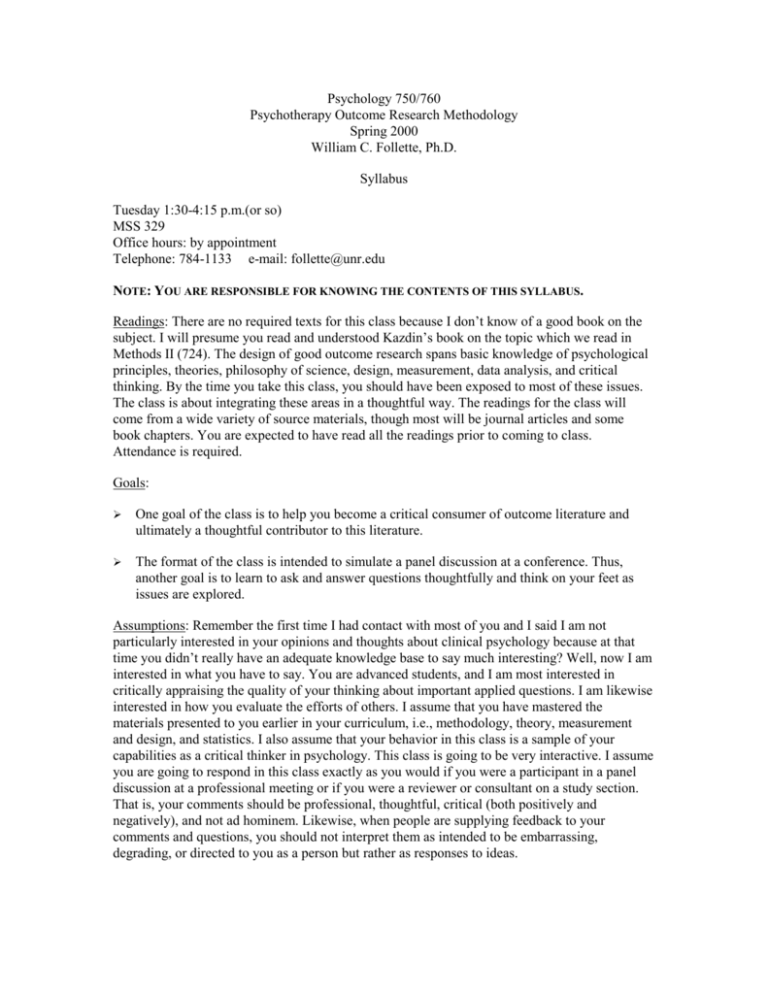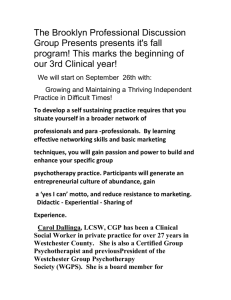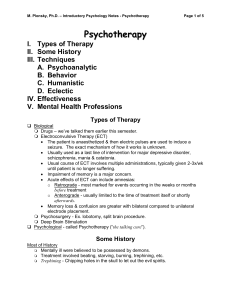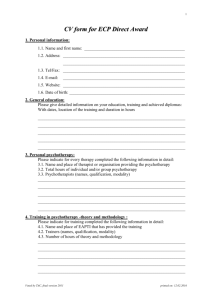PSY 750/760 - Association for Behavior Analysis International
advertisement

Psychology 750/760 Psychotherapy Outcome Research Methodology Spring 2000 William C. Follette, Ph.D. Syllabus Tuesday 1:30-4:15 p.m.(or so) MSS 329 Office hours: by appointment Telephone: 784-1133 e-mail: follette@unr.edu NOTE: YOU ARE RESPONSIBLE FOR KNOWING THE CONTENTS OF THIS SYLLABUS. Readings: There are no required texts for this class because I don’t know of a good book on the subject. I will presume you read and understood Kazdin’s book on the topic which we read in Methods II (724). The design of good outcome research spans basic knowledge of psychological principles, theories, philosophy of science, design, measurement, data analysis, and critical thinking. By the time you take this class, you should have been exposed to most of these issues. The class is about integrating these areas in a thoughtful way. The readings for the class will come from a wide variety of source materials, though most will be journal articles and some book chapters. You are expected to have read all the readings prior to coming to class. Attendance is required. Goals: One goal of the class is to help you become a critical consumer of outcome literature and ultimately a thoughtful contributor to this literature. The format of the class is intended to simulate a panel discussion at a conference. Thus, another goal is to learn to ask and answer questions thoughtfully and think on your feet as issues are explored. Assumptions: Remember the first time I had contact with most of you and I said I am not particularly interested in your opinions and thoughts about clinical psychology because at that time you didn’t really have an adequate knowledge base to say much interesting? Well, now I am interested in what you have to say. You are advanced students, and I am most interested in critically appraising the quality of your thinking about important applied questions. I am likewise interested in how you evaluate the efforts of others. I assume that you have mastered the materials presented to you earlier in your curriculum, i.e., methodology, theory, measurement and design, and statistics. I also assume that your behavior in this class is a sample of your capabilities as a critical thinker in psychology. This class is going to be very interactive. I assume you are going to respond in this class exactly as you would if you were a participant in a panel discussion at a professional meeting or if you were a reviewer or consultant on a study section. That is, your comments should be professional, thoughtful, critical (both positively and negatively), and not ad hominem. Likewise, when people are supplying feedback to your comments and questions, you should not interpret them as intended to be embarrassing, degrading, or directed to you as a person but rather as responses to ideas. Psychotherapy Outcome Methodology Page 2 Course evaluation: As you know, I like to sample evaluative behavior often. I also know that many advanced students aren’t so interested in taking tests any more, I am certainly not inclined to want to grade them. Besides, I can’t think of a very useful format for exams. So keeping in line with wanting to assess your critical thinking skills, I am going to grade on class participation. Class participation will be composed of three parts. On several occasions during the class each of you (in teams of two people) will be asked to pose a question, based on the current readings (though the question may involve issues from other past readings as well), to a two person team of your classmates who will be responsible for answering the question. The question must be e-mailed to the class by no later than Friday. The way it will go is this - the team asking the question will read the question to the entire class. The answering team will have approximately 10 - 20 minutes to present their response. The team that asks the question will then comment on the quality of the response. At that point, the whole class will have a chance to make any additional comments they wish to more fully flesh out the issues. Thus, one form of class participation is the quality of the question. A second form of class participation is the quality of the answer. The third form of class participation is your critical thinking behavior during the rest of the class, i.e., when you are not a designated asker or answerer. Guidelines on asking questions. Good questions would be those that are characterized by recognizing important contradictions in the readings, choices a researcher has to make in balancing tradeoffs, or unspecified vagaries that are fundamentally important. Good questions might well span more than one reading or even more than one week and relate a point earlier in the course to something we are discussing now. Good questions should have the potential to be answered, at least in terms of someone laying out the alternative ways one could address the question and the different implications for any alternatives. Good questions are not designed to embarrass whomever is answering them, but should allow one to engage the question. Weak questions are those that are factual ones one that can clearly be answered by referring more closely to an article. Weak questions are those that attend to specific details rather than grander questions, though there are exceptions to this guideline. Weak questions are those that can only be answered by opinion based on aesthetic choice rather than some other level of engage the materials. I don’t care if you ask a question to which you already know the answer or not. I presume that in the process of listening to the answer and responding to it, it will be instructive for all. Guidelines on answering questions. Good answers are those that are responsive to the fundamental issues contained in the question. They will bring together as broad a set of issues and readings as possible while still being relevant. They will avoid rhetorical devices such as “it depends on what you mean by X.” A good answer would say, if by X on means…then Y; however, if by X one means….then Z.” If it is clear to the rest of the world what is meant by X, then even this form of an answer is a rhetorical device. An answer should clear, and the grounds on which the answer is based should be made clear. It may be useful to say why one settled on this answer rather than another plausible one to demonstrate one’s critical thinking. After answering a question, one can suggest how a slightly different form of the question or assumptions behind a question may have led to a different set of considerations. Answers will assessed on the degree that they are constructive rather than condescending. Guidelines for person who asked the question on responding to answer. I’m looking for how you respond to input from a colleague. You should be able to summarize why you found the answer adequate, thought provoking, inadequate, incomplete, off the mark, or how it raises other questions the person who provides the answer did not anticipate. A modicum of gratuitous praise will be tolerated, but I am interested more in how you critically analyze the adequacy of the answer to your question. Psychotherapy Outcome Methodology Page 3 Class participation during the rest of class. I will be evaluating the quality of your questions, comments, and observations during the rest of the class as well. You will not pass this class if you do not participate to a very significant degree. I am looking for a give and take between class participants. For the purposes of this class, I do not value questions that are mere clarifications of what an article said unless it is vaguely written or self-contradictory. Likewise, because I want to hear you speak as scientists, I don’t want personal opinions that are expressed only as opinions. By that I mean, if you offer an opinion, it should be expressed as it relates to current or past readings (including the inadequacies of those readings) or a philosophical position contrasted with other philosophical positions. For example, an opinion like, “I think Howard is wrong because in some cases long-term therapy can work” is completely inadequate. One could say, “I think Howard is wrong because his analogy to a medical dose-response relationship assumes the following conditions that we know not to be the case according to X, Y, and Z” (and then list the dubious assumptions). Class should be like labs on really good days. One can ask all kinds of questions during the rest of class. Questions and exchanges that demonstrate higher quality participation will frequently follow the guidelines for questions and answers above. Quality and quantity count. A lack of either is not satisfactory. As always good (and sometimes tasteless) humor counts, too. Late in the semester we will dedicate a day to consultation for any research projects that people might have. Here people are free to present research ideas and turn to their classmates for consultation. Your job is to be critically constructive. Feedback: You can ask me for feedback anytime. I will e-mail you feedback about your participation on or about the 15th of February, March, and April. Disability Statement The Psychology Department is committed to equal opportunity in education for all students, including those with documented physical disabilities or documented learning disabilities. University policy states that it is the responsibility of students with documented disabilities to contact instructors during the first week of each semester to discuss appropriate accomodations to ensure equity in grading, classroom experiences and outside assignments. The instructor will meet with the student and staff members of the Student Services Center to formulate a written plan for appropriate accomodations, if required. Psychotherapy Outcome Methodology Page 4 Week 1 Orientation and administrative issues Week 2 No class Week 3 What are we trying to learn from outcome studies? Goldfried, M. R., Greenberg, L. S., & Marmar, C. (1990). Individual psychotherapy: Process and outcome. Annual Review of Psychology, 41, 659-688. Goldfried, M. R., & Wolfe, B. E. (1996). Psychotherapy practice and research: Repairing a strained alliance. American Psychologist, 51, 1007-1016. Hilliard, R. B. (1993). Single-case methodology in psychotherapy process and outcome research. Journal of Consulting and Clinical Psychology, 61(3), 373-380. Howard, K. I., Moras, K., Brill, P. L., Martinovich, Z., & Lutz, W. (1996). Evaluation of psychotherapy: Efficacy, effectiveness, and patient progress. American Psychologist, 51, 1059-1064. Lipsey, M. W., & Wilson, D. B. (1994). The efficacy of psychological, educational, and behavioral treatment: Confirmation from meta-analysis. American Psychologist, 48, 11811209. Smith, M. L., & Glass, G. V. (1977). Meta-analysis of psychotherapy outcome studies. American Psychologist, 32, 752-760. Whiston, S. C., & Sexton, T. L. (1993). An overview of psychotherapy outcome research: Implications for practice. Professional Psychology: Research and Practice, 24, 43-51. Wierzbicki, M. (1993). The effectiveness of psychotherapy. Issues in clinical psychology (pp. 748). Boston: Allyn & Bacon. Week 4 The Dodo Bird Phenomenon - Why? Baron, R. M., & Kenny, D. A. (1986). The moderator-mediator variable distinction in social psychological research: Conceptual, strategic, and statistical considerations. Journal of Personality and Social Psychology, 51, 1173-1182. Beutler, L. E. (1991). Have all won and must all have prizes? Revisiting Luborsky et al.'s verdict. Journal of Consulting and Clinical Psychology, 59, 226-232. Follette, W. C., & Compton, S. N. (in review). Correcting methodological weaknesses in traditional psychotherapy outcome research. . Luborsky, L., Singer, B., & Luborsky, L. (1975). Comparative studies of psychotherapies: Is it true that "Everyone has won and all must have prizes"? Archives of General Psychiatry, 32, 995-1008. Psychotherapy Outcome Methodology Page 5 Shadish, W. R., & Sweeney, R. B. (1991). Mediators and moderators in meta-analysis: There's a reason why we don't let dodo birds tell us which psychotherapies should have prizes. Journal of Consulting and Clinical Psychology, 59, 883-893. Week 5 Introduction to Design Issues I assume you recall the materials from 724 including all of Kazdin’s readings. Gendlin, E. T. (1986). What comes after traditional psychotherapy research? American Psychologist, 41, 131-136. Howard, K. I., Kopta, S. M., Krause, M. S., & Orlinksy, D. E. (1986). The dose-effect relationship in psychotherapy. American Psychologist, 41, 159-164. Hsu, L. M. (1989). Random sampling, randomization, and equivalence of contrasted groups in psychotherapy outcome research. Journal of Consulting and Clinical Psychology, 57, 131137. Imber, S. D., Glanz, L. M., Elkin, I., Sotsky, S. M., Boyer, J. L., & Leber, W. R. (1986). Ethical issues in psychotherapy outcome research: Problems in a collaborative clinical trials study. American Psychologist, 41, 137-146. Margraf, J., Ehlers, A., Roth, W. T., Clark, D. B., Sheikh, J., Agras, W. S., & Taylor, C. B. (1991). How "blind" are double-blind studies? Journal of Consulting and Clinical Psychology, 59, 184-187. Kazdin, A. E., & Bass, D. (1989). Power to detect differences between alternative treatments in comparative psychotherapy outcome research. Journal of Consulting and Clinical Psychology, 57, 138-147. Margraf, J., Ehlers, A., Roth, W. T., Clark, D. B., Sheikh, J., Agras, W. S., & Taylor, C. B. (1991). How "blind" are double-blind studies? Journal of Consulting and Clinical Psychology, 59, 184-187. Maxwell, S. E., Cole, D. A., Arvey, R. D., & Salas, E. (1991). A comparison of methods for increasing power in randomized between-subjects designs. Psychological Bulletin, 110, 328-337. Parloff, M. B. (1986). Placebo controls in psychotherapy research: A sine qua non or a placebo for research. Journal of Consulting and Clinical Psychology, 54, 79-87. Steenbarger, B. N. (1994). Duration and outcome in psychotherapy: An integrative review. Professional Psychology: Research and Practice, 25, 111-119. Stiles, W. B., Shapiro, D. A., & Elliott, R. (1986). Are all psychotherapies equivalent? American Psychologist, 41, 165-180. Wilkins, W. (1986). Placebo problems in psychotherapy research: Social-psychological alternatives to chemotherapy concepts. American Psychologist, 41, 551-556. Psychotherapy Outcome Methodology Page 6 Week 6 Attrition Armbruster, P., & Kazdin, A. E. (1994). Attrition in child psychotherapy. In T. H. Ollendick & R. J. Prinz (Eds.), Advances in clinical child psychology (Vol. 16, pp. 81-108). New York: Plenum Press. Ashurst, J. T., de la Rocha, O., & Tobis, J. (missing). Analysis of collateral data: A method for assessing and correcting the effects of attrition on internal validity. Journal of Experimental Education, 60, 215-234. Collins, J. F., & Dorus, W. (1991). Patient selection bias in analyses using only compliant patients. In J. A. Cramer & B. Spiker (Eds.), Patient compliance in medical practice and clinical trials (pp. 335-348). New York: Raven Press. Flick, S. N. (1988). Managing attrition in clinical research. Clinical Psychology Review, 8, 499516. Graham, J. W., & Donaldson, S. I. (1993). Evaluating interventions with differential attrition: The importance of nonresponse mechanisms and use of follow-up data. Journal of Applied Psychology, 78, 119-128. Howard, K. I., Krause, M. S., & Orlinsky, D. E. (1986). The attrition dilemma: Toward a new strategy for psychotherapy outcome research. Journal of Consulting and Clinical Psychology, 54, 106-110. Kazdin, A. E. (1994). Methodology, design, and evaluation in psychotherapy research. In A. E. Bergin & S. L. Garfield (Eds.), Handbook of psychotherapy and behavior change (Fourth ed., pp. 19-71). New York: Wiley. Kelly, T., Soloff, P. H., J., C., George, A., Lis, J. A., & Ulrich, R. (1992). Can we study (treat) borderline patients? Attrition from research and open treatment. Journal of Personality Disorders, 6, 417-433. Wierzbicki, M., & Pekarik, G. (1993). A meta-analysis of psychotherapy dropout. Professional Psychology: Research and Practice, 24(2), 190-195. Week 7 General discussion of readings to date This is a time to discuss where we have come and try to put together the ideas we have addressed so far. I’ll lead a discussion but am happy to respond to questions for the whole time as well. Week 8 Adherence Barber, J. P., & Crits-Christoph, P. (1996). Development of a therapist adherence/competence rating scale for supportive-expressive dynamic psychotherapy: A preliminary report. Psychotherapy Research, 6, 81-94. Psychotherapy Outcome Methodology Page 7 Butler, S. F., Henry, W. P., & Strupp, H. H. (1995). Measuring adherence in time-limited dynamic psychotherapy. Psychotherapy, 32, 629-638. Hill, C. E., O'Grady, K. E., & Elkin, I. (1992). Applying the Collaborative Study psychotherapy rating scale to rate therapist adherence in cognitive-behavior therapy, interpersonal therapy, and clinical management. Journal of Consulting and Clinical Psychology, 60, 73-79. Klein, D. F., & Rabkin, J. G. (1984). Specificity and strategy in psychotherapy research and practice. In J. B. W. Williams & R. L. Spitzer (Eds.), Psychotherapy research: Where are we and where should we go? (pp. 306-331). New York: Guilford. Mergenthaler, E., & Stinson, C. H. (1992). Psychotherapy transcription standards. Psychotherapy Research, 2, 125-142. Moncher, F. J., & Prinz, R. J. (1991). Treatment fidelity in outcome studies. Clinical Psychology Review, 11, 247-266. Shaw, B. F. Specification of the training and evaluation of cognitive therapists for outcome studies. (book section - ref unknown) Startup, M., & Shapiro, D. A. (1993). Therapist treatment fidelity in prescriptive vs. exploratory psychotherapy. British Journal of Clinical Psychology, 32, 443-456. Waltz, J., Addis, M. E., Koerner, K., & Jacobson, N. S. (1993). Testing the integrity of a psychotherapy protocol: Assessment of adherence and competence. Journal of Consulting and Clinical Psychology, 61, 620-630. Week 9 Therapists as factors Berman, J. S., & Norton, N. C. (1985). Does professional training make a therapist more effective? Psychological Bulletin, 98, 401-406. Beutler, L. E., Machado, P. P. P., & Neufeldt, S. A. (1994). Therapist variables. In A. E. Bergin & S. L. Garfield (Eds.), Handbook of psychotherapy and behavior change (Fourth ed., pp. 229-269). New York: Wiley. Crits-Christoph, P., & Mintz, J. (1991). Implications of therapist effects for the design and analysis of comparative studies of psychotherapies. Journal of Consulting and Clinical Psychology, 59, 20-26. Crits-Christopher, P., Baranackie, K., Kurcias, J. S., Beck, A. T., Carroll, K., Perry, K., Luborsky, L., McLellan, A. T., Gallagher, D., & Zitrin, C. (1991). Meta-analysis of therapist effects in psychotherapy outcome studies. Psychotherapy Research, 1, 81-91. Martindale, C. (1978). The therapist-as-fixed-effects-fallacy in psychotherapy research. Journal of Consulting and Clinical Psychology, 46, 1526-1530. Stein, D., & Lambert, M. J. (1984). On the relationship between therapist experience and psychotherapy outcome. Clinical Psychology Review, 4, 127-142. Psychotherapy Outcome Methodology Page 8 Week 10 Designs: Control groups, ATI, Fixed vs. Random effects, experimental approaches/ Mediating, Moderating, Subject, and Dependent variables Howard, K. I., Lueger, R. J., Maling, M. S., & Martinovich, Z. (1993). A phase model of psychotherapy outcome: Causal mediation of change. Journal of Consulting and Clinical Psychology, 61, 678-685. Kelly, T. A. (1992). Patient and therapist values in psychotherapy: Perceived changes, assimilation, similarity, and outcome. Journal of Consulting and Clinical Psychology, 60, 34-40. Hilliard, R. B. (1993). Single-case methodology in psychotherapy process and outcome research. Journal of Consulting and Clinical Psychology, 61, 373-380. Jones, E. E. (1993). Introduction to special section: Single-case research in psychotherapy. Journal of Consulting and Clinical Psychology, 61, 371-372. Jones, E. E., Ghannam, J., Nigg, J. T., & Dyer, J. F. P. (1993). A paradigm for single-case research: The time series study of a long-term psychotherapy for depression. Journal of Consulting and Clinical Psychology, 61, 381-394. Shoham-Salomon, V., & Hannah, M. T. (1991). Client-treatment interaction in the study of differential change processes. Journal of Consulting and Clinical Psychology, 59, 217-225. Smith, B., & Sechrest, L. (1991). Treatment of aptitiude x treatment interactions. Journal of Consulting and Clinical Psychology, 59, 233-244. Snow, R. E. (1991). Aptitude-treatment interaction as a framework for research on individual differences in psychotherapy. JCCP Journal of Consulting and Clinical Psychology, 59, 205-216. Su, L. M. (1989). Random sampling, randomization and equivalence of contrasted groups in psychotherapy outcome research. Journal of Consulting and Clinical Psychology, 57, 131137. White, S. J., & Freedman, L. S. (1978). Allocations of patients to treatment groups in a controlled clinical study. British Journal of Cancer, 37, 849-857. Week 11 Spring Break - No class Week 12 Data analysis Psychotherapy Outcome Methodology Page 9 Bereiter, C. (1963). Some persisting dilemmas in the measurement of change. In C. W. Harris (Ed.), Problems in measuring change . Madison, WI: University of Wisconsin Press. Canfield, M. L., Walker, W. R., & Brown, L. G. (1991). Contingency interaction analysis in psychotherapy. Journal of Consulting and Clinical Psychology, 59, 58-66. Heatherington, L. (1989). Toward more meaningful clinical research: Taking context into account in coding psychotherapy interaction. Psychotherapy, 26, 436-447. Kopta, S. M., Howard, K. I., Lowry, J. L., & Beutler, L. E. (1994). Patterns of symptomatic recovery in psychotherapy. Journal of Consulting and Clinical Psychology, 62, 1009-1016. Lambert, M. J., & Hill, C. E. (1994). Assessing psychotherapy outcomes and processes. In A. E. Bergin & S. L. Garfield (Eds.), Handbook of psychotherapy and behavior change (Fourth ed., pp. 72-113). New York: Wiley. Mergenthaler, E., & Stinson, C. H. (1992). Psychotherapy transcription standards. Psychotherapy Research, 2, 125-142. Nicewander, W. A., & Price, J. M. (1983). Reliability of measurement and the power of statistical tests: Some new results. Psychological Bulletin, 94, 524-533. VandenBos, G. R. (1996). Outcome assessment of psychotherapy. American Psychologist, 51, 1005. Week 13 Perspectives on active components in therapy Bowers, T., & Clum, G. (1988). Relative contributions of specific and nonspecific treatment effects: Meta-analysis of placebo-controlled behavior therapy research. Psychological Bulletin, 103, 315-323. Brody, N. (1990). Behavior therapy versus placebo: Comment on Bowers and Clum's metaanalysis. Psychological Bulletin, 107, 106-109. Clarke, G. N. (1995). Improving the transition from basic efficacy research to effectiveness studies: Methodological issues and procedures. Journal of Consulting and Clinical Psychology, 63, 718-725. Clum, G. A., & Bowers, T. G. (1990). Behavior therapy better than placebo treatments: Fact or artifact. Psychological Bulletin, 107, 110-113. Eysenck, H. J. (1952). The effects of psychotherapy: An Evaluation. Journal of Consulting Psychology, 16, 319-324. Missing but described in Wierzbicki chapter. Feifel, H., & Eells, J. (1963). Patients and therapists assess the same psychotherapy. Journal of Consulting Psychology, 27, 310-318. Garfield, S. L. (1991). Psychotherapy models and outcome research. American Psychologist, 46, 1350-1351. Week 14 Consultation discussion Psychotherapy Outcome Methodology Page 10 Week 15 Critique of Jacobson’s depression grant This week we will read Neil Jacobson grant application for his dismantling study of cognitive therapy. The purpose of this discussion is to bring to bear the critical thinking you have been honing this semester. In this discussion, you should evaluate the scope of Jacobson’s questions and the adequacy of his design and measures. How well has he addressed the issues you have decided are important to you? How would you have formulated the research question given the epistemological considerations you have decided are important?








![UW2 - Psychiatric Treatments [2014]](http://s3.studylib.net/store/data/006859622_1-db6167287f6c6867e59a56494e37a7e7-300x300.png)